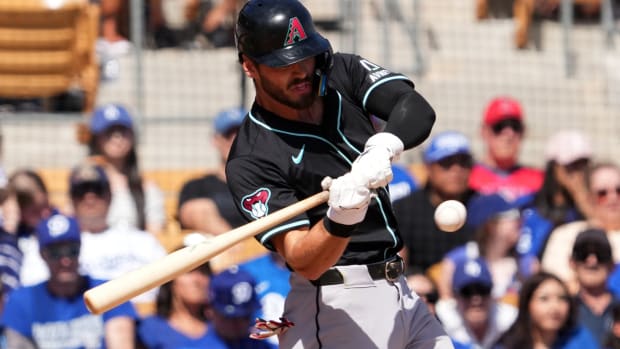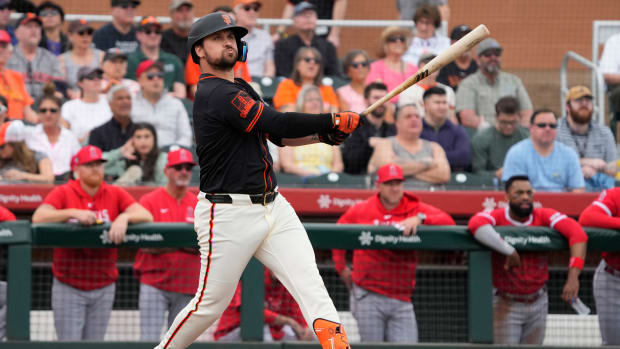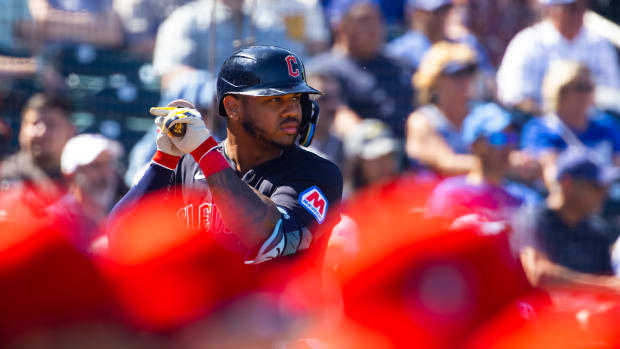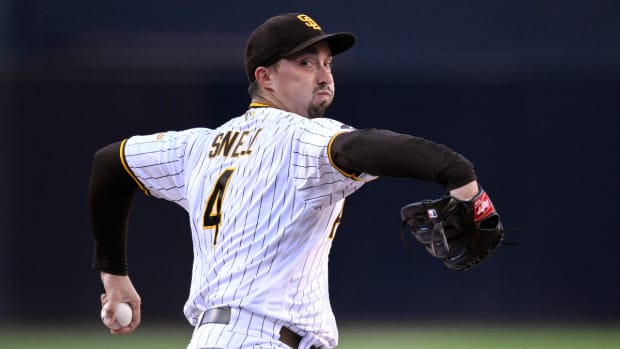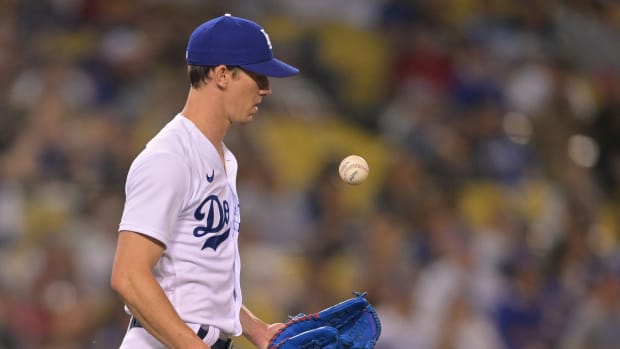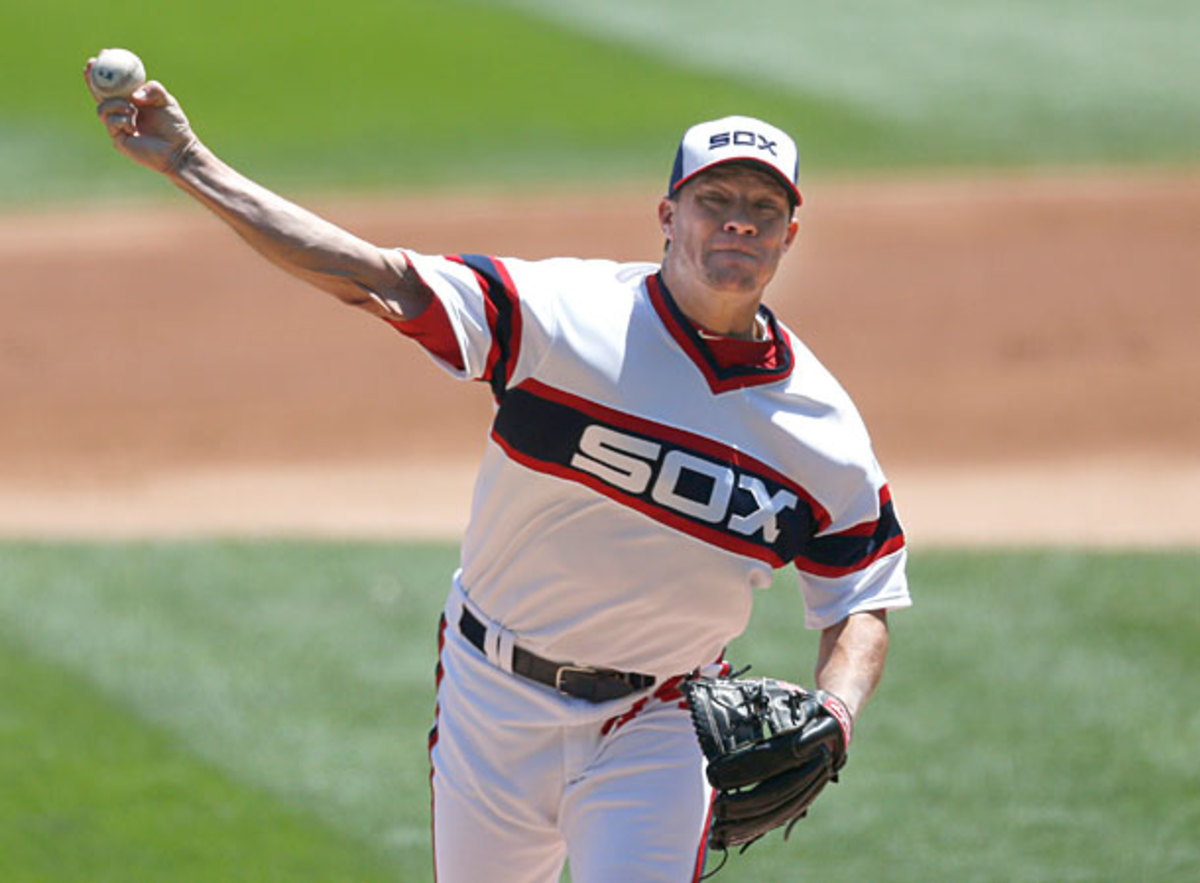
Trade deadline winners and losers
It didn't happen on deadline day, but Jake Peavy to Boston was the biggest deal of the summer. (Charles Rex Arbogast/AP)
After all of that buildup, the final hours before the July 31 trading deadline were underwhelming, to say the least. Only four trades went down, two of which were little more than footnotes.
As noted in our live blog, that's down from 12 deadline deals last year, 10 in 2011, 14 in 2010 and eight in 2009. Expanding the scope of consideration to cover the final week before Wednesday's deadline, only 12 deals went down.
In short, the trade deadline ain't what it used to be, due to the addition of the second wild card in each league, changes in the most recent Collective Bargaining Agreement, and increasing traction of analytical methods in front offices. Though it amounts to no more than a coin-flip game, the second wild-card slot convinces mediocre teams they at least have a chance of going to the postseason, and therefore shouldn't sell or do anything that's perceived as waving the white flag. The CBA adopted in the winter of 2011 changed free agent compensation rules such that players traded in the final year of their contracts no longer yield draft picks to the teams they leave behind. The more analytical bent of front offices has led teams to focus on retaining their (mostly) home-grown young players via long-term extensions instead of building through free agency, which is increasingly seen as a sucker's bet. As such, teams are placing increasingly higher values on prospects and players under club control.
Thus, when it comes time to make a deal July 31, where before a team might aggressively trade away a passel of prospects for a bat, a starter and a reliever knowing that at least some of those players might net supplementary first-round picks even if they don't help win a championship, teams realize a typical addition may not mean more than an additional win or two over the final third of a season. Such a trade might have an impact for a sure-fire contender with a legitimate chance at a division title but may only bump up the chances of a longshot getting to play a single extra game by only a few percentage points. When weighed rationally against the savings to be had by holding onto a player for the remainder of his club-controlled years, that simply may not make sense.
With all that in mind, here's a look at this year's winners and losers, with an eye not just on what happened Wednesday, but what happened this entire month, since new CBA rules that put limits on international signing bonuses also made them tradeable commodities as of the July 2 signing date, leading some teams to open for business early.
WINNERS
Teams who got their shopping done early
Forget waiting until the last minute. As far as the best starting pitchers on the market went, the Dodgers traded for Ricky Nolasco on July 6. They've since gotten four starts with a 3.13 ERA, four starts that might have been made by Mat Magill, Ted Lilly or some other replacement-level stiff. The Rangers traded for Matt Garza on July 22 and he's given them two strong turns that would have been taken by something on the order of their organization's 10th best starter given all of their injuries. Alfonso Soriano, acquired by the Yankees last Friday, bolstered a wheezing offense with a huge four-hit game Sunday, including the game-winning hit.
CORCORAN: Jake Peavy trade immediately solidifies Red Sox rotation
By moving early, not only did those teams get some of the few impact players who moved this month, they raised the prices on the remaining alternatives to the point they became prohibitive in some cases. No doubt even the teams that got their relievers Monday (Rays, Tigers and Braves) or participated in Tuesday's three-way swap (Red Sox, White Sox and Tigers) spared their general managers some last-minute anxiety.
Teams who have filled needs from within
At the moment, nine players from the Baseball Prospectus Top 101 Prospects list — the Cardinals' Shelby Miller and Trevor Rosenthal, the Pirates' Gerrit Cole, the Rays' Wil Myers and Chris Archer, the Braves' Julio Teheran, the Reds' Tony Cingrani, the Dodgers' Yasiel Puig, and the Rangers' Martin Perez — are rookies playing key roles on contending teams. Before the year is out, the Rangers' Jurickson Profar, the Orioles' Kevin Gausman and the Diamondbacks' Tyler Skaggs may sharpen their games and do so as well. It's not as though rookies helping out contenders is a foreign concept, or that those guys would have all been trade fodder in years past, but with the exception that latter trio, the success of each aforementioned player prevented their teams from needing to fill gaps from outside the organization — many of those gaps created by injuries to players such as Chris Carpenter, Alex Cobb, Johnny Cueto, Matt Harrison, Matt Kemp and James McDonald. With the free agent market drying up and restrictions placed on amateur talent acquisition, prospects have more value than ever. Blocking them with aging veterans or squandering them for rent-a-players makes no sense. Let them play.
They needed rotation help, they were never all that heavily involved with Garza or Nolasco. They found the Phillies' asking price for Cliff Lee to be exorbitant, potentially costing them at least Xander Bogaerts or Jackie Bradley Jr., not to mention some $70 million in future salary commitments. They wouldn't bite, and Tuesday night did very well to acquire Jake Peavy. With one 30-start season since the start of 2008, durability isn't his strong suit, but the skills are still there, and to get him — and a low-end reliever, Brayan Villareal — they sold especially high on slick-fielding shortstop Jose Iglesias, who won't ever replicate that torrid 165-PA run (.403/.455/.517) in his career. They're not likely to miss any of the three other prospects they parted with, either. The pitchers who have patched the rotation beyond their current front four and the injured Clay Buchholz have delivered a 5.63 ERA across 16 starts. Peavy is a significant upgrade on that, one who could be the difference between a division title and a wild-card game.
Chicago Cubs
By my count, the Cubs have made eight trades this month, shedding Jim Hendry-era relics Soriano and Carlos Marmol, adding almost a million dollars in international bonus money in hopes of signing top international prospect Eloy Jimenez (though that deal remains unconsummated) and getting an impressive five-player haul for Matt Garza. They've saved some money and added talent, though they didn't gain as much of either as they might have had they moved Nate Schierholtz, David DeJesus or both.
If they didn't get the bat they needed to fill their DH slot, they didn't overpay, either, and throughout the month, they managed to add a fair bit of pitching in the form of Bud Norris, Francisco Rodriguez and Scott Feldman. None of them is a game-changing move, but all of them fit into general manager Dan Duquette's aggressive buy-in-bulk philosophy. All are inexpensive and Norris still has two years of club control remaining. There's reason to be concerned about the impact of Norris' flyball tendency in Camden Yards and the AL East in general, but his track record of missing bats (8.4 strikeouts per nine in his career, though just 6.4 per nine this year) is better than any of the current O's starters, and he buys time for the likes of Gausman and Zach Britton to find their footing. They didn't give up a whole lot in struggling pitchers Jake Arrieta and Pedro Strop (for Feldman), infielder Nick Delmonico (for Rodriguez), outfielder L.J. Hoes (for Norris), A-ball lefty Josh Hader and a competitive balance draft pick, which means they still have Gausman, Dylan Bundy and Jonathan Schoop -- their three top 100 prospects coming into the year.
LOSERS
Teams looking for position players
It says something that Soriano was the closest thing to an impact bat dealt this entire month, though someday the Cubs' Mike Olt and the White Sox Avasail Garcia may hit in the middle of their respective lineups. For all of the rumor-milling, Marlon Byrd, DeJesus, Raul Ibanez, Kendry Morales, Justin Morneau, Mike Morse, Alexei Ramirez, Alex Rios, Carlos Ruiz, Schierholtz, Chase Utley, Michael Young and so many others all stayed put, perhaps because the perception of scarcity drove asking prices into the stratosphere. Meanwhile, the position players with major league experience who changed hands on Wednesday amounted to Hoes (0-for-4 in the majors for his career), Astro-turned-Royal Justin Maxwell (.222/.311/.419 career) and the offensively inept Twin-turned-Dodger Drew Butera (.182/.230/.263, bad enough to be the second-worst hitter of the past 20 years). The moral of the story is to build your lineup over the winter, because the midseason trade market is a lousy place to find a middle-of-the-order bat or anything more than a patch — and good luck getting that for a reasonable price.
No deadline day deal was as big a puzzle as the one that sent Ian Kennedy to the Padres for lefty reliever Joe Thatcher, Double-A righty reliever Matt Stites, and a compensation pick. With a 5.23 ERA (and 4.57 FIP), Kennedy is having a lousy year, but he was a rotation stud for the team from 2010-2012, averaging 208 innings with a 3.55 ERA (115 ERA+) and 8.0 strikeouts per nine, and placing fourth in the NL Cy Young balloting in the middle year while helping the team win the NL West. He's making just $4.265 million, with two more years of club control and despite the prospect of his delivering more than 450 future above-average innings for the team, they valued the 50 or so Thatcher might give them before he reaches free agency — as well as the other two prospects — more highly. That makes very little sense even if it's part of the cultural purge that swept through the team this past winter. This is a pitcher who at worst is on a tier with Nolasco and Garza, minus the pending free agency.
While the Snakes may use the excuse that they have Trevor Cahill and Brandon McCarthy on the way back from the disabled list, both of those pitchers have similar ERAs (4.66 for Cahill, 5.00 for McCarthy) without missing nearly as many bats, and neither is as durable. Even with Skagg and Archie Bradley as coming prospects, they already have abundant proof in the former's rough introduction to the majors that the transition to readiness isn't automatic. Beyond that, while Thatcher may help, this is a team whose late-game righties — J.J. Putz, Heath Bell, David Hernandez and Brad Ziegler — screamed for an immediate upgrade or two, and whose entire outfield has hit a cumulative .256/.317/.383, with all five principals slugging .411 or below while playing in a hitters' park. In short, general manager Kevin Towers missed a golden opportunity to improve a contending team that's just 24-28 over the past two months.
They had some of the market's most tradeable commodities in pending free agents Ruiz, Utley and Young, a worn-down farm system, the game's third-highest payroll ($159.6 million) and a 1.2 percent chance of making the playoffs given their 48-56 record and −74 run differential — and yet Ruben Amaro Jr. stood pat even after losing both Ryan Howard and Ben Revere for extended lengths of time. Some of it was understandable. Utley, Young, and Lee all have partial or full no-trade clauses, and the latter has $70 million remaining on his deal. But mostly, Amaro waited too long to confront the reality that the Phils aren't contenders, let sentiment prevent him from making tough calls, and overvalued an expensive closer (Jonathan Papelbon) who sounds as though he'd rather be elsewhere. Maybe the Phils get something done during the waiver period given the salaries Papelbon and Young are carrying, and maybe they sign Utley to a reasonable extension that lets him retire a Phillie, but the bottom line is they did nothing to improve their team this month, and they're the worse for it.
Seattle Mariners
After the Phillies, no team had more attractive pieces to be dealt than the Mariners, who had corner bats galore in Ibanez, Morales and Morse, plus back-end starter Joe Saunders and lefty reliever Oliver Perez. All will be free agents at the end of the year, and none will be worth a qualifying offer to net a draft pick. Yet until the last 24 hours before the deadline, it didn't sound as though general manager Jack Zduriencik had any intention of moving anybody. And on Wednesday, only discussions with the Orioles over Morse and Perez rose above the din. With a 15-9 record this month, Jack Z didn't want to break up the band, but he's deluded if he thinks even a .500 finish is valuable enough to supersede the ongoing youth movement.
Justin Morneau































